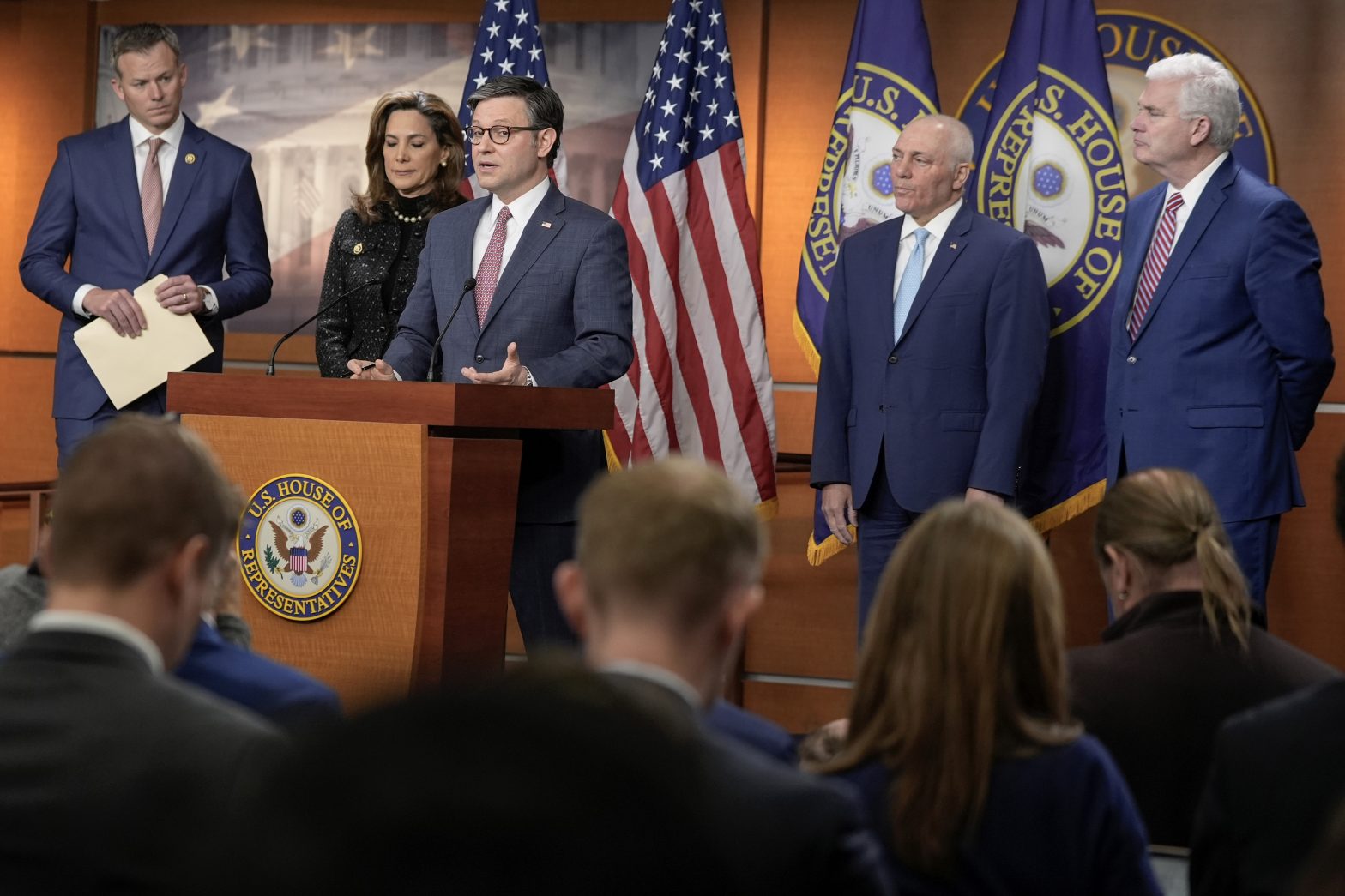House Advances Reauthorization of US Spy Program as GOP Upheaval Threatens Final Passage

WASHINGTON (AP) — House Republicans on Friday advanced a bill that would reauthorize a crucial national security surveillance program, a second attempt just days after a conservative revolt prevented similar legislation from reaching the floor.
Speaker Mike Johnson brought forward a Plan B that, if passed, would reform and extend a section of the Foreign Intelligence Surveillance Act known as Section 702 for a shortened period of two years, instead of the full five-year reauthorization first proposed, in hopes that the shorter timeline will sway GOP critics. But a separate provision, ending warrantless surveillance of Americans, will also be offered on the floor Friday, potentially jeopardizing final passage of the bill.
“We’re going to try to find a way to unlock the rule. And I think it’s possible,” Johnson told reporters Wednesday evening, referring to the step needed to bring up the legislation. “I mean, there are some differences of opinion. But I think everyone — most everyone — understands the necessity of getting this right and getting it done.”
It is unclear if Johnson, who has called the program “critical” to national security, will have the Republican support necessary to push the bill through final passage.
Skepticism of the government’s spy powers has grown dramatically in recent years, particularly on the right. Republicans have clashed for months over what a legislative overhaul of the FISA surveillance program should look like, creating divisions that spilled onto the House floor this week as 19 Republicans broke with their party to prevent the bill from coming up for a vote.
However, some of the original opponents signaled their support for the new plan late Thursday.
“The two-year timeframe is a much better landing spot because it gives us two years to see if any of this works rather than kicking it out five years,” Rep. Chip Roy, R-Texas, said Thursday. “They say these reforms are going to work. Well, I guess we’ll find out.”
The legislation in question would permit the U.S. government to collect, without a warrant, the communications of non-Americans located outside the country to gather foreign intelligence. The reauthorization is currently tied to a series of reforms aimed at satisfying critics who complained of civil liberties violations against Americans.
But far-right opponents have complained that those changes did not go far enough. Among the detractors are some of Johnson’s harshest critics, members of the ultra-conservative House Freedom Caucus, who have railed against the speaker the last several months for reaching across the aisle to carry out the basic functions of the government.
To appease some of those critics, Johnson plans to bring forward next week a separate proposal that would close a loophole that allows U.S. officials to collect data on Americans from big tech companies without a warrant.
“All of that added up to something that I think gave a greater deal of comfort,” Roy said.
Though the program is technically set to expire April 19, the Biden administration has said it expects its authority to collect intelligence to remain operational for at least another year, thanks to an opinion earlier this month from the Foreign Intelligence Surveillance Court, which receives surveillance applications. But officials say that court approval shouldn’t be a substitute for congressional authorization, especially since communications companies could cease cooperation with the government.
First authorized in 2008, the spy tool has been renewed several times since then as U.S. officials see it as crucial in disrupting terror attacks, cyber intrusions and foreign espionage. It has also produced intelligence that the U.S. has relied on for specific operations.
But the administration’s efforts to secure reauthorization of the program have repeatedly encountered fierce, and bipartisan, pushback, with Democrats like Sen. Ron Wyden who have long championed civil liberties aligning with Republican supporters of former President Donald Trump, who in a post on Truth Social on Wednesday stated incorrectly that Section 702 had been used to spy on his presidential campaign.
“Kill FISA,” Trump wrote in all capital letters. “It was illegally used against me, and many others. They spied on my campaign.” A former adviser to his 2016 presidential campaign was targeted for surveillance over potential ties to Russia under a different section of the law.
A specific area of concern for lawmakers is the FBI’s use of the vast intelligence repository to search for information about Americans and others in the U.S. Though the surveillance program only targets non-Americans in other countries, it also collects communications of Americans when they are in contact with those targeted foreigners.
In the past year, U.S. officials have revealed a series of abuses and mistakes by FBI analysts in improperly querying the intelligence repository for information about Americans or others in the U.S., including about a member of Congress and participants in the racial justice protests of 2020 and the Jan. 6, 2021, riot at the U.S. Capitol.
Those violations have led to demands for the FBI to have a warrant before conducting database queries on Americans, which FBI director Chris Wray has warned would effectively gut the program’s effectiveness and would also be legally unnecessary given that the information in the database has already been lawfully collected.
“While it is imperative that we ensure this critical authority of 702 does not lapse, we also must not undercut the effectiveness of this essential tool with a warrant requirement or some similar restriction, paralyzing our ability to tackle fast-moving threats,” Wray said in a speech Tuesday.
___
Associated Press writer Kevin Freking contributed to this report.
























